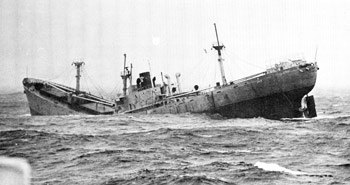Salvage!
by Nicholas Walsh, PA
The salvor wins
an award, not
the ship itself.
You’re tending traps one blustery fall day, and as you watch an expensive motor yacht runs up on a ledge. The yacht backs off the ledge, loses power and begins to flood. Despite menacing rocks you come alongside, and the passengers clamber onto your boat and are ordered into the cabin. You and your sternman jump on the yacht and pull up some floorboards, jam greasy rags into a big crack, and run the intake for your engine-driven bilge pump into the yacht. Just able to keep ahead of the flooding, you secure the yacht alongside the lobsterboat and make for a nearby harbor. You’ve radioed ahead, and a shipyard has cleared its Travelift® and is able immediately to haul the yacht. Damage to the yacht is $50,000. Had you not come along the yacht would have sunk, for a loss of $650,000.
At that point you have a salvage claim against the yacht, secured by a maritime lien. Admiralty law is the most ancient commercial law on the planet, and since at least 1500 years before Christ it has been recognized that those who through their efforts are able to save a ship from loss are entitled to an award – a salvage award. It is sometimes thought that a salvor gains title to the ship he saved, but that’s not so: the salvor wins an award, not the ship itself.
The ancient Phoenicians recognized that the more challenging the salvage, the bigger the award ought to be, and modern law follows the same principle. The factors set forth in the 1989 International Convention on Salvage (by the IMO, or International Maritime Organization) follow admiralty law closely and generally govern salvage awards.
The value of the salvaged vessel is the single most important factor. If the yacht in my example above had been a rotting derelict of small value, your claim would be minimal.
Next is the the measure of success obtained by the salvor. Suppose you managed to get the boat into the harbor, but there it sank. Although she is later raised, the damage is great – a total loss for insurance purposes. Your reward will be much smaller in consequence.
The nature and degree of the danger is another critical factor. If you were up to your neck in rising water belowdecks trying to stop a leak in a yacht which was by all appearances determined to founder, your reward will be much greater than if all you did was offer a tow.
The skill and efforts of the salvors is another big factor in determining the size of the award. If the efforts required to salvage a ship requires days of backbreaking labor and superb seamanship, the award will be a greater proportion of the salved ship’s value.
The equipment, time used and expenses and losses incurred by the salvors are also important. If a salvor uses an expensive ship and pumps, he or she will get a bigger award, and if the salvor loses some of the gear that will affect the award as well.

We also consider whether the salvor’s ship was dedicated to salvage, or had equipment intended just for salvage. This factor recognizes that the maritime world should reward those who purchase, man and maintain expensive salvage ships. For example, Europe’s Bay of Biscay, where oil tankers from the Med and Africa are exposed to easterly storms, huge seas and a nasty lee shore, has powerful and costly salvage tugs standing by, ready to prevent a disaster should a ship lose power. If the salvage awards do not reflect the capital costs associated with building such ships and keeping them ready, the salvage firms will seek better uses for their capital and more ships will wreck.
Let’s apply these factors to a salvage such as described above. The salved yacht had a value (pre-wreck) of $650,000. The salvage was quite successful, with no additional damage done to the yacht and the yacht safely hauled out of the water. There was considerable danger, to you and your boat.
You happened to have an engine driven bilge pump installed which could be used to pump another boat. A fair amount of skill was required to effect the salvage. If the yacht sank the fuel would likely have escaped through the tank vents, so your efforts prevented pollution, a new factor I didn’t mention above.
Time and expenses incurred are small, and there is a modest amount of risk of civil liability. You would have maintained the boat and been available regardless of possible salvage opportunities.
It’s up to the judge, but I would give this case an award of $150,000, give or take $50,000. These cases are either negotiated to settlement with the ship’s insurance company, or the salvor arrests the ship in federal court and seeks to have it sold to satisfy the salvage award.
The same principles, strangely enough, apply to salvage of even long-lost treasure ships. The ship, which is perhaps scattered over a square mile debris field, is considered to be “in peril.” The salvor’s efforts “rescue” the ship from that peril. The factors listed above apply, with a typically very substantial award (perhaps 95% of the value of the salved treasure) to the salvor, all in consideration of the reality that but for the salvage the wreck might never even have been found. The rest goes, typically, to the insurance companies which paid long-ago claims, or sometimes to heirs of owners of the cargo.
I have prosecuted a number of salvage cases over the years, and they are always fascinating.
Stay out of trouble.
Nicholas Walsh is an admiralty attorney with an office in Portland, Maine. He may be reached at 207-772-2191, or nwalsh@gwi.net.
